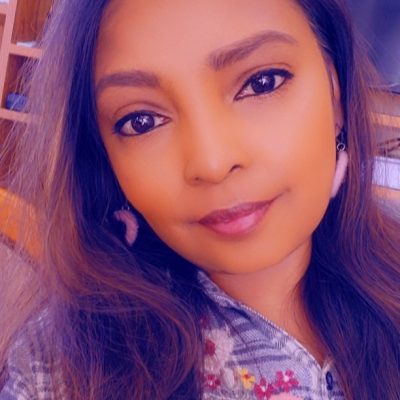
The Story of Nushruth: Never Give Up and Always Stay Strong
Patient
Mauritius
I would like to share my personal life experiences with all of you, because International Thalassaemia Day is celebrated specifically to raise awareness of this disease, its preventive measures and how to reduce its incidence among people all over the world.
My name is Nushruth Ebrahim Saib. I am 40 years old, and I work as a receptionist/telephone operator in a parastatal organisation in Mauritius. When I was 4 months old, my parents learnt that I had thalassaemia major. Thalassaemia is an inherited (i.e. passed on from parent to child) blood disorder caused by the body not making enough of a protein called haemoglobin, an important component of red blood cells.
No one else in my family had thalassaemia, and my parents did not know that they carried one of the genes that cause the disease. The diagnosis came as a shock to everyone. Since I was first diagnosed as an infant, I was given blood transfusions every four weeks to maintain my level of healthy red blood cells and keep me healthy and alive. Without regular blood transfusions, I feel achy, tired and weak. In fact, my survival depends on these blood transfusions, but that comes with challenges.
The main complication associated with blood transfusions is iron overload, which can have a negative impact on several organ systems. Iron overload can lead to heart and liver disease as well as endocrine disorders such as diabetes, low bone mass, etc.
When I was born with thalassaemia, iron chelation therapy did not yet exist; I only started this therapy at the age of 12. For almost 18 years of my life I took a drug called “Desferal”, which had to be administered through a needle into my leg, arm or stomach every night for 12 hours, five nights a week. Desferal was used to remove the excess iron that had built up in my body. This medication was administered via a pump that had to remain strapped to my body. It was uncomfortable and sometimes emotionally difficult because the treatment prevented me from being physically active and doing other things between 7pm and 7am, causing me to miss out on many childhood activities.
Eventually I switched to a newer medication called Asunra, which I take in green tea. This greatly improved my quality of life because I no longer had to insert a needle every night and stay hooked up to a pump. Although it was much easier to take Asunra by mouth than a Desferal injection, I found some aspects of taking it difficult: it had to be taken on an empty stomach, it took time to dissolve in my green tea, and I hate the grainy texture of my green tea after the medication had dissolved. My ferritin level was very high at this point.
Eventually I realised that no one would care about me more than myself, and that without my health I would never be able to pursue my dreams. This realisation gave me the push I needed to be consistent with my medication and stick to the treatment plan my doctor had prescribed for me.
I am grateful to the medical staff of the Thalassaemia Ward and the rest of the staff at Victoria Hospital, the Thalassaemia Society of Mauritius, the Blood Bank, the Blood Donors Association, the blood donors and all the people involved with thalassaemia who are committed to ensuring that I receive the best possible treatment, as well as the support of my family and friends.
Thanks to the Thalassaemia Society of Mauritius (TSM) who sponsored my trip to Hanoi in Vietnam to attend an international conference which gave me the opportunity to meet other thalassaemia patients from all over the world and gain so much knowledge from foreign doctors.
TSM Mauritius is very committed to the welfare of thalassaemia patients in the country and their efforts have not been in vain; each hospital has a dedicated thalassaemia ward with all the facilities and comfort we need.
I am also grateful to my employer for giving me the opportunity to work with them and be independent. They are very lenient with me when I have to go to my appointments and examinations. Every year they also organise a blood drive where most of the staff and members of the public come to donate blood.
I encourage people with thalassaemia like me to look after their iron levels. Never give up and always stay strong!







